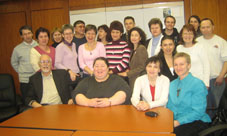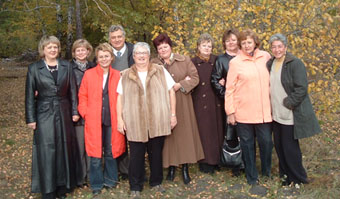
First Travel Study (January 17-31, 2004):
Russian mental health leaders at the University of Calgary, with the Canadian program participants
Seven Demonstration model sites in three Program regions are pursuing the objective of developing community-based mental health rehabilitation approaches to test and demonstrate alternatives to Russia’s large and aging hospital-based mental health system. Leadership is provided by the graduates of Mental Health COL cohorts.
A set of General Guiding Principles to guide the development of mental health stream demonstration models, has been adopted. Consistent with these principles, demonstration sites are developing an increasing number of model services directed towards prevention of admission to mental hospitals, early return to the community and, increasingly, provision of community supports.
Participating regions include Stavropol, Omsk, and Central Russia Region (including Moscow, Moscow region, Tambov, Ryazan, and St. Petersburg) – please see the Site Map. For detailed information on Demonstration model developments, please click on the following links:
General Observations Russian English
Omsk Russian English
Stavropol Russian English
Moscow and Central Russia Russian English
The four-year Program within the Mental Health Stream included a total of three (3) two-week Travel Study Tours: first on January 17 – 31, 2004, second on February 14 - 28, 2005, and third on February 16 – March 5, 2006. The Study Tours were hosted by the University of Calgary in partnership with the Calgary Health Region.
These intense learning events were designed to enhance knowledge capacity and strategies for collaboration, governance, and innovative policy development in mental health. With this purpose, the composition of visiting groups encouraged the participants’ diversity by both background and geography. Each of the visiting groups was comprised of 10 to 12 Russian participants representing a unique blend of family advocacy organization leaders, mental health professionals, and ministerial leaders from all three Program regions. The hosting activities involved Alberta consumer leaders, government officials, and mental health experts, and were enriching for both countries’ participants.
Participants: Top Russian mental health consumers, professional and government leaders who are currently involved in demonstration model development in different regions of Russia.
For information on learning schedules, sites, and themes, please see the latest (2006) Study Tour Working Schedule: Russian English

First Travel Study (January 17-31, 2004):
Russian mental health leaders at the University of Calgary, with the Canadian program participants

Second Travel Study (February 14-28, 2005):
Russian mental health leaders at the University of Calgary, with the Canadian program participants

THIRD TRAVEL STUDY (February 16 – March 5, 2006): Russian mental health leaders at the University of Calgary, with the Canadian program participants from Calgary and Winnipeg
Canadian experts’ on-site consultations help immensely in deepening the understanding and expertise in each region. Each of the seven demonstration model sites in Russia has a different main focus. Canadian content experts relevant to the focus of each particular region visit the regions, to provide narrow-focused on-site consultation to Project Leaders. For example, a pilot project developing an Early Psychotic Episode Treatment program designed to prevent hospitalization, would have an expert in that area spend time with them. On many occasions, leaders from other regions in Russia join their colleagues on a particular Program site, to benefit from these consultations. To date, the following content expert consultation events have been completed:
Community-based mental health rehabilitation programs include employment activities in Omsk region

Dr. Michael Eleff and Dr. Isaac Gurovich in Moscow, October 2004
Dr. Neufeldt (right) at Tambov Regional Psychiatric Hospital with colleagues from Tambov, Ryazan and the Moscow Institute, April 2005
Early Psychotic Episode Treatment Program in Moscow

Beth Evans and Faye Knudson with Dr. A. Utkin and Omsk professionals Omsk, October 2005